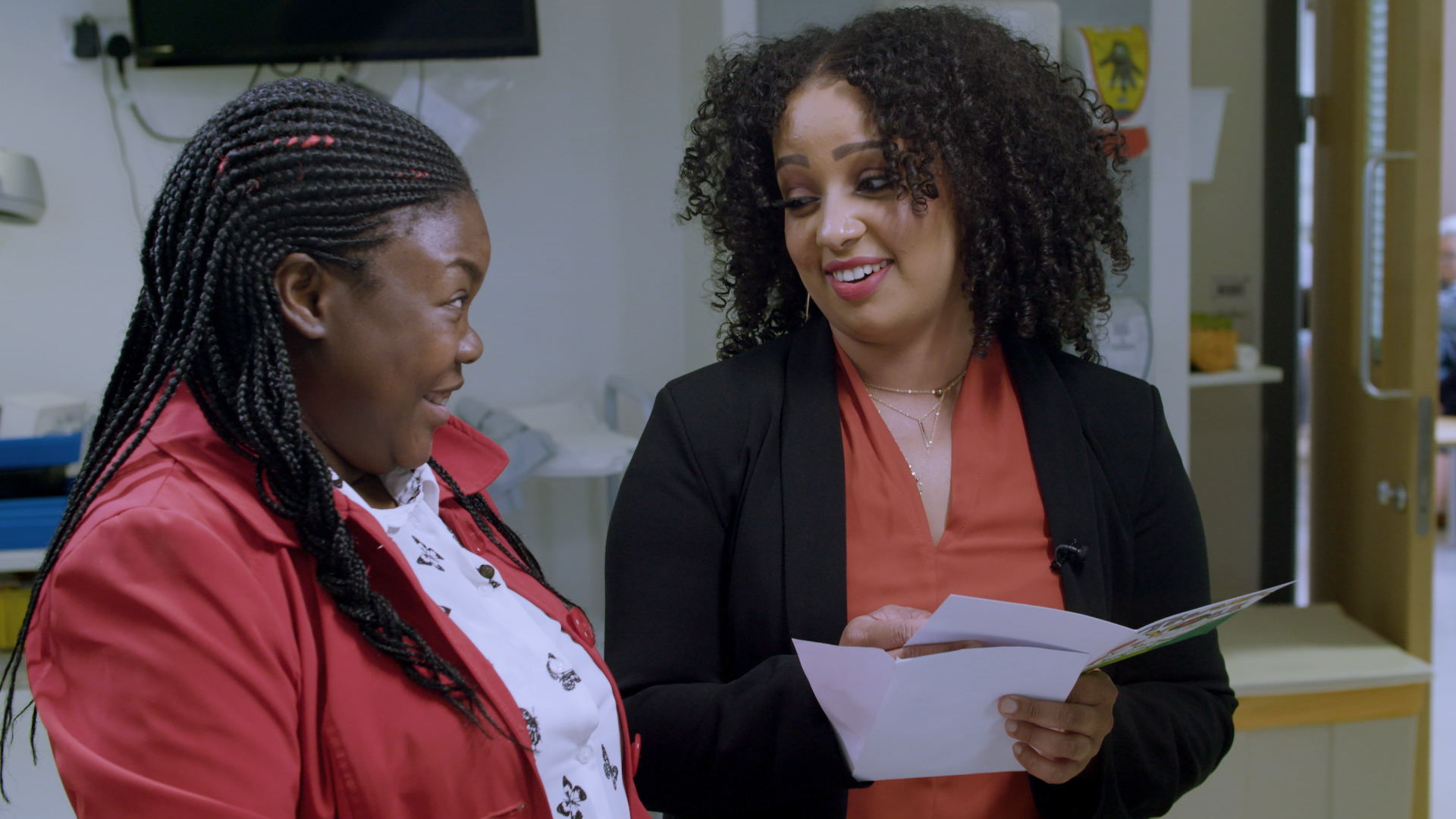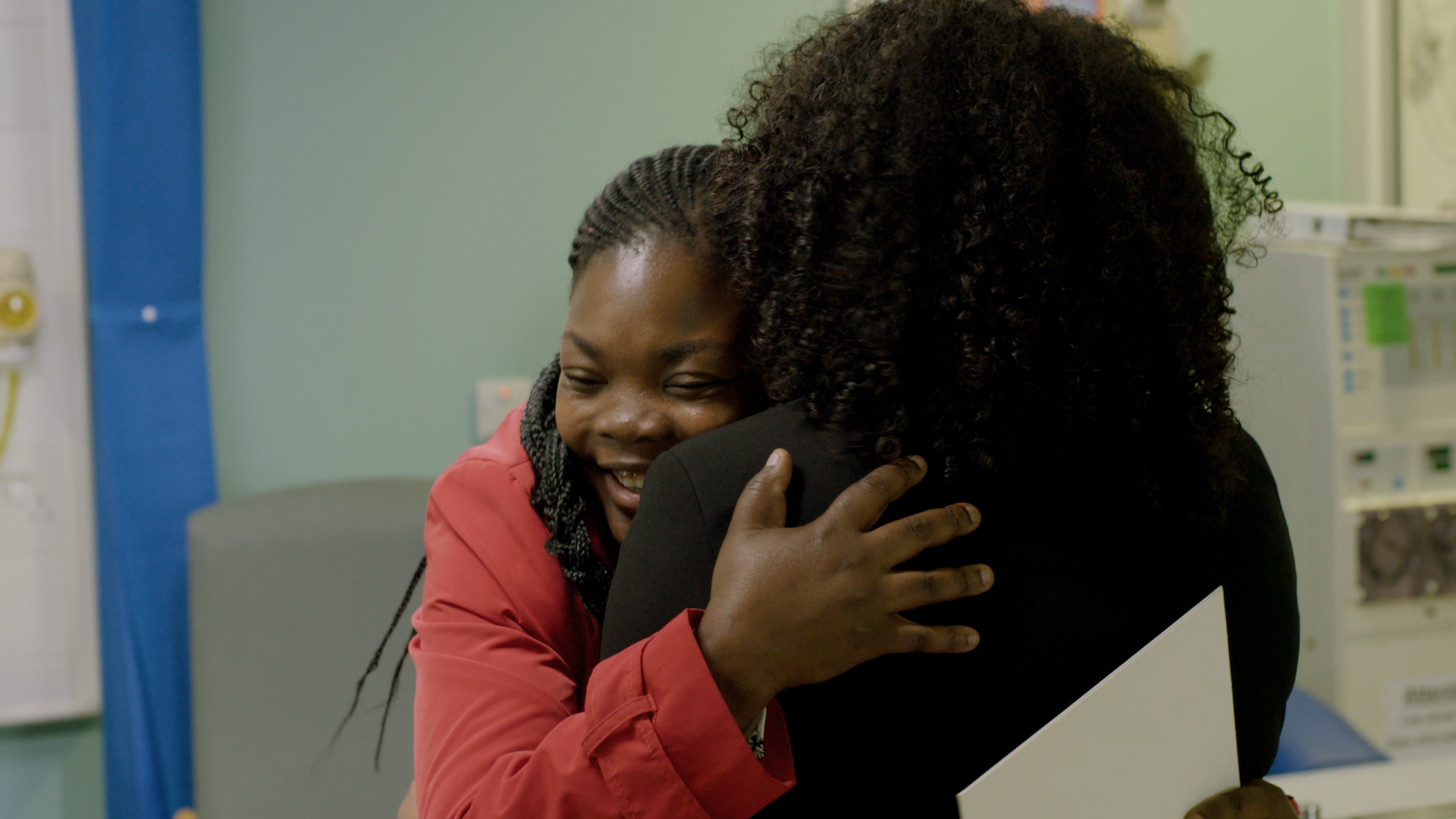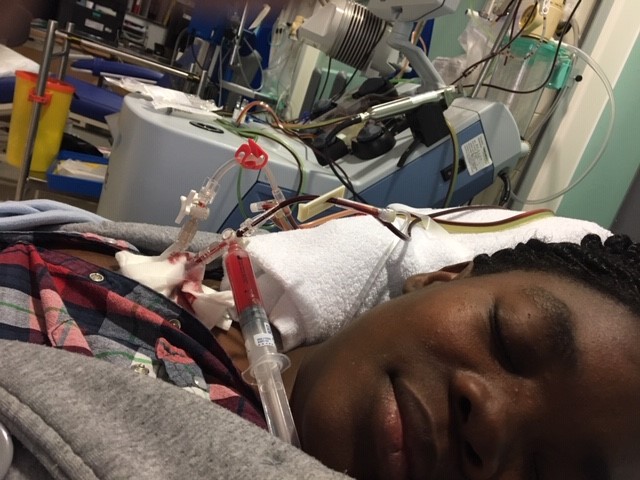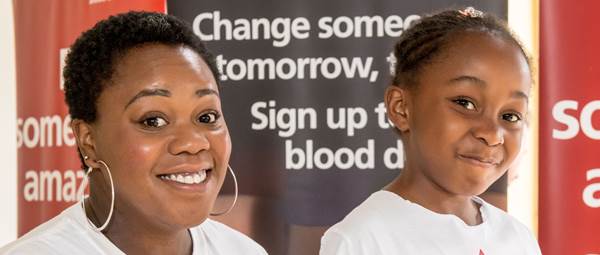Blood donor and her recipient brought together for emotional Sickle Cell Awareness Month appeal
New figures show 29% increase in black blood donors but urgent shortage remains
NHS Blood and Transplant has brought together a woman with a blood disease and a donor with the same rare blood type who has helped keep her alive.
Solome Mealin received a transfusion of blood from Zamzam Aba-Nur. NHS Blood Transplant used its treatment records and its donor database to bring the two together at its specialist unit where Solome is treated, NHSBT’s Therapeutic Apheresis Services Unit in Leeds. (1)
 Solome and Zamzam are supporting NHS Blood and Transplant’s urgent call for black people to register blood donors over Sickle Cell Awareness Month (September). Both have the rare Ro blood subtype, which is more common in black people.
Solome and Zamzam are supporting NHS Blood and Transplant’s urgent call for black people to register blood donors over Sickle Cell Awareness Month (September). Both have the rare Ro blood subtype, which is more common in black people.
More black blood donors than ever are saving lives. New NHSBT figures show the number of black blood donors has grown by 29% over the past three years in response to urgent appeals but the situation is still very serious due to the shortage of donors with the Ro subtype.
NHS Blood and Transplant still needs 40,000 new black blood donors because black people are more likely to have Ro. (2) Demand for the type is expected to grow by 10% next year, new figures show.
Zamzam walked into the Therapeutic Apheresis Services Unit and Solome gave her an emotional hug and a thank you card from her children, watched by nurses who clapped and wiped away tears.
Solome, aged 39, a mum of three from Burmantofts in Leeds, whose own mother died of sickle cell disease, told Zamzam: “Your blood is coursing through my veins. Because of you and blood donation I can have time with my children. I never had a chance to be with my mum. Because of blood donors, I am here watching them grow up. I cannot thank you enough.”
The red blood cells of sickle cell patients form into a sickle or crescent moon shape. These cells can block blood vessels, causing agonising pain, and creating a risk of organ damage, stroke, and death. Solome receives transfusions of eight units of blood every six weeks to reduce the risks.
Solome added: “Without blood I suffer horrendous pain, even with morphine. Blood donors like Zamzam are angels sent by God. To people from a black background I just want to say ‘please, donate blood. You will be a lifesaver’.”
Zamzam, 26, a rehabilitation therapist from Old Trafford in Greater Manchester, said: “I started donating when I saw people getting transfusions during placements as a nursing student. It gives me a buzz to get the text message saying where your blood has gone.”
She added: “When you donate, it’s really simple and you just get on with your day – meeting Solome has brought home that it’s actually life changing for someone else. I feel very lucky to have seen how my donations are making a difference.”
People from the same ethnic background are more likely to have the same blood types. The shortage of black blood donors makes it harder to find the best matched blood for black patients. That puts them at more risk of reactions from minor blood groups. NHSBT also has to supply O negative instead which puts pressure on O negative stocks. (3)
 John James OBE, Chief Executive of the Sickle Cell Society, said: “Blood donors like Zamzam are vital in helping people living with sickle cell to live healthier and less painful lives. We hope this meeting inspires people to start donating blood and helps the public understand the important role they can play in supporting the sickle cell community.”
John James OBE, Chief Executive of the Sickle Cell Society, said: “Blood donors like Zamzam are vital in helping people living with sickle cell to live healthier and less painful lives. We hope this meeting inspires people to start donating blood and helps the public understand the important role they can play in supporting the sickle cell community.”
Mike Stredder, Director of Blood Donation at NHS Blood and Transplant said: “This month we can celebrate how more and more black people are saving lives by donating blood.
“However the shortage of black donors remains, which makes it harder to find the best matched blood for black people, putting them at greater risk of potentially life threatening transfusion reactions. Blood donation is quick, easy and safe and we urge black people inspired by Zamzam and Solome to register as donors today.”
Become a blood donor. Register today and book and appointment by calling 0300 123 23 23, downloading the GiveBloodNHS app, or visiting blood.co.uk
If you can’t find an appointment for the new few days don’t worry – please book for in a few weeks or months’ time and you will still be saving lives.
- NHSBT has several Therapeutic Apheresis Services units. These are specialist units offering advanced treatments for unusual diseases. NHSBT’s Leeds unit is located within St James’ University Hospital.
- Black and mixed black donors (9,915 - June 2016 vs 12,787 - June 2019)
- Ro is a subtype of the Rh blood group system. Ro is around 10 times more common in black people than white people. Demand is growing because more and more patients with sickle cell disease are being put on regular full body blood transfusions, known as red cell exchanges, rather than getting ‘top up’ transfusions, because red cell exchanges have been found to greatly reduce the risk of stroke. NHS Blood and Transplant has only been able to supply Ro blood when requested by hospitals 55% of the time during the 2019/20 financial year so far and demand continues to grow. O negative is used as a substitute.

